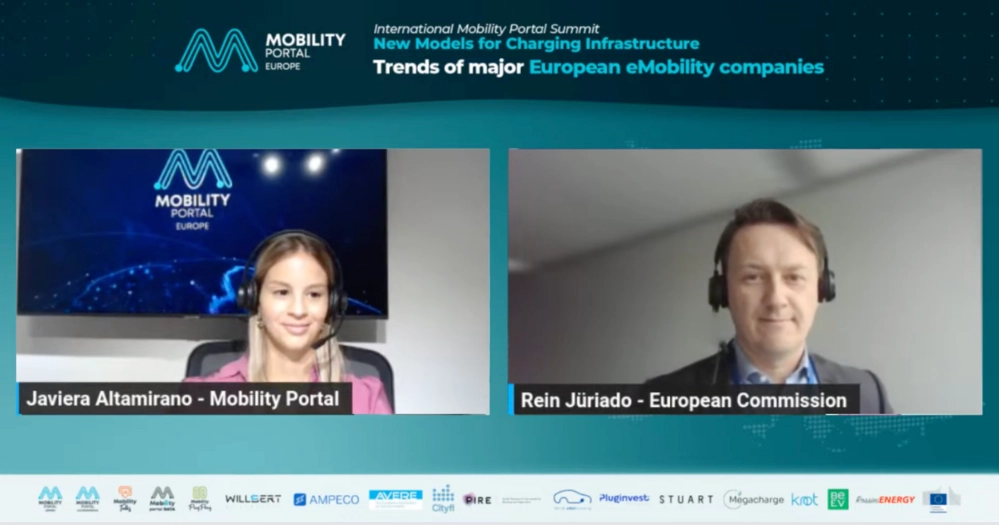The European Commission continues to promote the transition to electromobility by facilitating one of its key tools: financing for member countries.

In this regard, Rein Jüriado, Policy Officer at the European Commission, reveals to Mobility Portal Europe:
“The Commission has published a new call for tenders under its funding mechanism, the Connecting Europe Facility (CEF) for Transport Programme – Alternative Fuels Infrastructure Facility (AFIF).”
Furthermore, he anticipates that there will be 1 billion euros available to support the deployment of alternative fuels supply infrastructure along the Trans-European Network of Transport (TEN-T).
It is important to note that the CEF program has 25.6 billion euros available for EU budget grants for the period 2021-2027.
“I should definitely encourage everybody to look at this opportunities because we have shifted around a little with the priorities, and there will be three cut-off dates,” he details.
Applicants can submit their proposals before September 24, 2024, June 11, 2025, and December 17, 2025, at 17:00 (CET).
This call for proposals covers the deployment of alternative fuel infrastructures for road, maritime, inland waterway, and air transport.
It will be carried out concerning public electric charging pools and publicly accessible hydrogen refueling stations along the EU’s main transport corridors and nodes.
Specifically, for heavy vehicles, support will be provided for megawatt charging stations.
This second phase of AFIF (2024-2025) will support the objectives set in the Regulation for the deployment of alternative fuels infrastructure (AFIR).
In this way, this measure contributes to countries achieving the objectives set by AFIR, expected to be met by 2025 or 2030.
The regulation will come into effect on April 13, placing Europe currently in the development phase, where companies and countries are preparing to implement it.
According to Jüriado, there has been a growth of four or five times in the last four years in terms of charging infrastructure, both at the European and global levels.
However, not all EU member countries are in the same situation.
Nations like Germany, the Netherlands, and France lead the transition, while countries like Belgium, Denmark, and Finland demonstrated significant progress in the last year.
On the other hand, there are countries lagging behind in deployment.
Despite these disparities, all are making efforts to meet the objectives set by the European Commission and, in this particular case, with the AFIR regulation.
In this context, Jüriado assures: “There are good chances that the AFIR objectives will be met.”
This regulation arises from the need for a common European methodology to set goals and take action under national policy frameworks.
To achieve them, each country is implementing different incentives, policies, and regulatory measures.
“From the perspective of the European Commission, it is evident that the implementation of various mechanisms is crucial to drive development,” he emphasizes.
Not only local authorities but society as a whole must foster this progress, adopting a conducive attitude to participate in this transition, whether as corporate or private customers.
It is relevant to note that a review of the AFIR will take place in 2026.
How is the market for electric trucks progressing?
It makes no sense to extensively promote the charging network if users do not adopt electric vehicles.
One of the segments that generates greater uncertainty is trucks.
According to figures published by the European Automobile Manufacturers’ Association (ACEA), in 2023, diesel continued to dominate the truck market, representing 95.7 per cent of registrations.
Meanwhile, eTruck sales accounted for 1.5 per cent of the market, experiencing a notable growth of 234.1 per cent.
As Jüriado mentions, many companies show great interest in electrifying their fleets, but at the same time, they are unwilling to bear the additional costs.
“Electric trucks are still about two or three times more expensive than a diesel truck,” he points out.
Therefore, it is crucial to address this issue to achieve significant deployment.
Not only is the vehicle price an obstacle for companies, but also the lack of infrastructure on roads, something that would be addressed with the implementation of AFIR.
“Now, with our European regulations, we really have mandatory targets for the infrastructure that will generate the necessary market,” he concludes.
Following is the participation of Rein Jüriado, Policy Officer at the European Commission, during the “International Mobility Portal Summit”:








